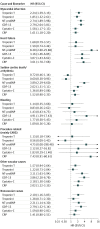Association of Multiple Biomarkers With Risk of All-Cause and Cause-Specific Mortality After Acute Coronary Syndromes: A Secondary Analysis of the PLATO Biomarker Study
- PMID: 30427997
- PMCID: PMC6583102
- DOI: 10.1001/jamacardio.2018.3811
Association of Multiple Biomarkers With Risk of All-Cause and Cause-Specific Mortality After Acute Coronary Syndromes: A Secondary Analysis of the PLATO Biomarker Study
Abstract
Importance: Mortality remains at about 5% within a year after an acute coronary syndrome event. Prior studies have assessed biomarkers in relation to all-cause or cardiovascular deaths but not across multiple causes.
Objective: To assess if different biomarkers provide information about the risk for all-cause and cause-specific mortality.
Design, setting, and participants: The Platelet Inhibition and Patient Outcomes (PLATO) trial randomized 18 624 patients with acute coronary syndrome to ticagrelor or clopidogrel from October 2006 through July 2008. In this secondary analysis biomarker substudy, 17 095 patients participated.
Main outcomes and measures: Death due to myocardial infarction, heart failure, sudden cardiac death/arrhythmia, bleeding, procedures, other vascular causes, and nonvascular causes, as well as all-cause death.
Exposures: At baseline, levels of cystatin-C, growth differentiation factor-15 (GDF-15), high-sensitivity C-reactive protein, high-sensitivity troponin I and T, and N-terminal pro-B-type natriuretic peptide (NT-proBNP) were determined.
Results: The median (interquartile range) age of patients was 62.0 (54.0-71.0) years. Of 17 095 patients, 782 (4.6%) died during follow-up. The continuous associations between biomarkers and all-cause and cause-specific mortality were modeled using Cox models and presented as hazard ratio (HR) comparing the upper vs lower quartile. For all-cause mortality, NT-proBNP and GDF-15 were the strongest markers with adjusted HRs of 2.96 (95% CI, 2.33-3.76) and 2.65 (95% CI, 2.17-3.24), respectively. Concerning death due to heart failure, NT-proBNP was associated with an 8-fold and C-reactive protein, GDF-15, and cystatin-C, with a 3-fold increase in risk. Regarding sudden cardiac death/arrhythmia, NT-proBNP was associated with a 4-fold increased risk and GDF-15 with a doubling in risk. Growth differentiation factor-15 had the strongest associations with other vascular and nonvascular deaths and was possibly associated with death due to major bleeding (HR, 4.91; 95% CI, 1.39-17.43).
Conclusions and relevance: In patients with acute coronary syndrome, baseline levels of NT-proBNP and GDF-15 were strong markers associated with all-cause death based on their associations with death due to heart failure as well as due to arrhythmia and sudden cardiac death. Growth differentiation factor-15 had the strongest associations with death due to other vascular or nonvascular causes and possibly with death due to bleeding.
Trial registration: ClinicalTrials.gov Identifier: NCT00391872.
Conflict of interest statement
Figures


Comment in
-
Moving the Needle Toward a More Personalized Means of Patient Care.JAMA Cardiol. 2018 Dec 1;3(12):1146-1148. doi: 10.1001/jamacardio.2018.3900. JAMA Cardiol. 2018. PMID: 30427978 No abstract available.
Similar articles
-
Biomarkers in relation to the effects of ticagrelor in comparison with clopidogrel in non-ST-elevation acute coronary syndrome patients managed with or without in-hospital revascularization: a substudy from the Prospective Randomized Platelet Inhibition and Patient Outcomes (PLATO) trial.Circulation. 2014 Jan 21;129(3):293-303. doi: 10.1161/CIRCULATIONAHA.113.004420. Epub 2013 Oct 29. Circulation. 2014. PMID: 24170388 Clinical Trial.
-
Biomarkers and Coronary Lesions Predict Outcomes after Revascularization in Non-ST-Elevation Acute Coronary Syndrome.Clin Chem. 2017 Feb;63(2):573-584. doi: 10.1373/clinchem.2016.261271. Epub 2016 Dec 8. Clin Chem. 2017. PMID: 27932413 Clinical Trial.
-
Improved risk stratification of patients with acute coronary syndromes using a combination of hsTnT, NT-proBNP and hsCRP with the GRACE score.Eur Heart J Acute Cardiovasc Care. 2018 Mar;7(2):129-138. doi: 10.1177/2048872616684678. Epub 2016 Dec 28. Eur Heart J Acute Cardiovasc Care. 2018. PMID: 28029055 Clinical Trial.
-
N-terminal prohormone B-type natriuretic peptide and cardiovascular risk in stable coronary artery disease: a meta-analysis of nine prospective studies.Rev Cardiovasc Med. 2013;14(2-4):e92-8. doi: 10.3909/ricm0644. Rev Cardiovasc Med. 2013. PMID: 24448259 Review.
-
Current Use of Cardiac Biomarkers in Various Heart Conditions.Endocr Metab Immune Disord Drug Targets. 2021;21(6):980-993. doi: 10.2174/1871530320999200831171748. Endocr Metab Immune Disord Drug Targets. 2021. PMID: 32867665 Review.
Cited by
-
Comprehensive Quality Analysis of Conventional and Novel Biomarkers in Diagnosing and Predicting Prognosis of Coronary Artery Disease, Acute Coronary Syndrome, and Heart Failure, a Comprehensive Literature Review.J Cardiovasc Transl Res. 2024 Dec;17(6):1258-1285. doi: 10.1007/s12265-024-10540-8. Epub 2024 Jul 12. J Cardiovasc Transl Res. 2024. PMID: 38995611 Review.
-
Prognostic Value of N-Terminal Pro-B-Type Natriuretic Peptide and High-Sensitivity C-Reactive Protein in Patients With Previous Myocardial Infarction.Front Cardiovasc Med. 2022 Feb 24;9:797297. doi: 10.3389/fcvm.2022.797297. eCollection 2022. Front Cardiovasc Med. 2022. PMID: 35282356 Free PMC article.
-
Growth Differentiation Factor-15 in Asian IHD Patients: Should We Use to Guide Therapeutic Decision?JACC Asia. 2023 Jun 20;3(3):472-474. doi: 10.1016/j.jacasi.2023.04.004. eCollection 2023 Jun. JACC Asia. 2023. PMID: 37396426 Free PMC article.
-
Putting the Measurement of Physical Capacity of Older Adults in Its Place.Circulation. 2019 Apr 23;139(17):2000-2002. doi: 10.1161/CIRCULATIONAHA.119.039116. Circulation. 2019. PMID: 31013138 Free PMC article. No abstract available.
-
Growth Differentiation Factor 15 and Risk of Bleeding Events: The Atherosclerosis Risk in Communities Study.J Am Heart Assoc. 2023 Mar 21;12(6):e023847. doi: 10.1161/JAHA.121.023847. Epub 2023 Mar 16. J Am Heart Assoc. 2023. PMID: 36927042 Free PMC article.
References
Publication types
MeSH terms
Substances
Associated data
LinkOut - more resources
Full Text Sources
Other Literature Sources
Medical
Research Materials

